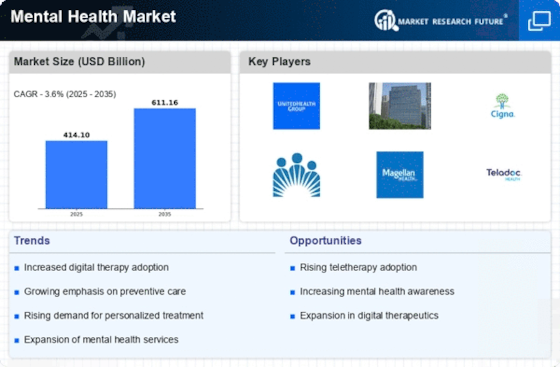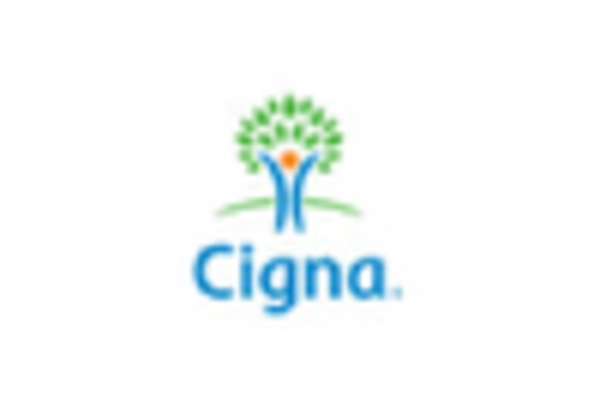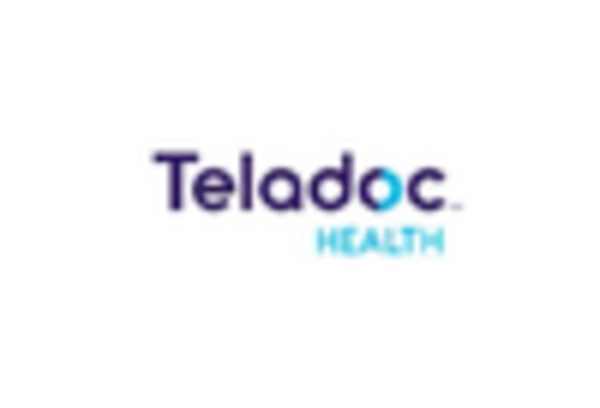Therapy
Counseling
Medication
Support Groups
Children
Adolescents
Adults
Elderly
Depression
Anxiety Disorders
Bipolar Disorder
Schizophrenia
Inpatient
Outpatient
Residential
Online
North America
Europe
South America
Asia Pacific
Middle East and Africa
North America Outlook (USD Billion, 2019-2035)
Mental Health Market by Service Type
Therapy
Counseling
Medication
Support Groups
Mental Health Market by Patient Type
Children
Adolescents
Adults
Elderly
Mental Health Market by Disorder Type
Depression
Anxiety Disorders
Bipolar Disorder
Schizophrenia
Mental Health Market by Treatment Setting Type
Inpatient
Outpatient
Residential
Online
Mental Health Market by Regional Type
US
Canada
US Outlook (USD Billion, 2019-2035)
Mental Health Market by Service Type
Therapy
Counseling
Medication
Support Groups
Mental Health Market by Patient Type
Children
Adolescents
Adults
Elderly
Mental Health Market by Disorder Type
Depression
Anxiety Disorders
Bipolar Disorder
Schizophrenia
Mental Health Market by Treatment Setting Type
Inpatient
Outpatient
Residential
Online
CANADA Outlook (USD Billion, 2019-2035)
Mental Health Market by Service Type
Therapy
Counseling
Medication
Support Groups
Mental Health Market by Patient Type
Children
Adolescents
Adults
Elderly
Mental Health Market by Disorder Type
Depression
Anxiety Disorders
Bipolar Disorder
Schizophrenia
Mental Health Market by Treatment Setting Type
Inpatient
Outpatient
Residential
Online
Europe Outlook (USD Billion, 2019-2035)
Mental Health Market by Service Type
Therapy
Counseling
Medication
Support Groups
Mental Health Market by Patient Type
Children
Adolescents
Adults
Elderly
Mental Health Market by Disorder Type
Depression
Anxiety Disorders
Bipolar Disorder
Schizophrenia
Mental Health Market by Treatment Setting Type
Inpatient
Outpatient
Residential
Online
Mental Health Market by Regional Type
Germany
UK
France
Russia
Italy
Spain
Rest of Europe
GERMANY Outlook (USD Billion, 2019-2035)
Mental Health Market by Service Type
Therapy
Counseling
Medication
Support Groups
Mental Health Market by Patient Type
Children
Adolescents
Adults
Elderly
Mental Health Market by Disorder Type
Depression
Anxiety Disorders
Bipolar Disorder
Schizophrenia
Mental Health Market by Treatment Setting Type
Inpatient
Outpatient
Residential
Online
UK Outlook (USD Billion, 2019-2035)
Mental Health Market by Service Type
Therapy
Counseling
Medication
Support Groups
Mental Health Market by Patient Type
Children
Adolescents
Adults
Elderly
Mental Health Market by Disorder Type
Depression
Anxiety Disorders
Bipolar Disorder
Schizophrenia
Mental Health Market by Treatment Setting Type
Inpatient
Outpatient
Residential
Online
FRANCE Outlook (USD Billion, 2019-2035)
Mental Health Market by Service Type
Therapy
Counseling
Medication
Support Groups
Mental Health Market by Patient Type
Children
Adolescents
Adults
Elderly
Mental Health Market by Disorder Type
Depression
Anxiety Disorders
Bipolar Disorder
Schizophrenia
Mental Health Market by Treatment Setting Type
Inpatient
Outpatient
Residential
Online
RUSSIA Outlook (USD Billion, 2019-2035)
Mental Health Market by Service Type
Therapy
Counseling
Medication
Support Groups
Mental Health Market by Patient Type
Children
Adolescents
Adults
Elderly
Mental Health Market by Disorder Type
Depression
Anxiety Disorders
Bipolar Disorder
Schizophrenia
Mental Health Market by Treatment Setting Type
Inpatient
Outpatient
Residential
Online
ITALY Outlook (USD Billion, 2019-2035)
Mental Health Market by Service Type
Therapy
Counseling
Medication
Support Groups
Mental Health Market by Patient Type
Children
Adolescents
Adults
Elderly
Mental Health Market by Disorder Type
Depression
Anxiety Disorders
Bipolar Disorder
Schizophrenia
Mental Health Market by Treatment Setting Type
Inpatient
Outpatient
Residential
Online
SPAIN Outlook (USD Billion, 2019-2035)
Mental Health Market by Service Type
Therapy
Counseling
Medication
Support Groups
Mental Health Market by Patient Type
Children
Adolescents
Adults
Elderly
Mental Health Market by Disorder Type
Depression
Anxiety Disorders
Bipolar Disorder
Schizophrenia
Mental Health Market by Treatment Setting Type
Inpatient
Outpatient
Residential
Online
REST OF EUROPE Outlook (USD Billion, 2019-2035)
Mental Health Market by Service Type
Therapy
Counseling
Medication
Support Groups
Mental Health Market by Patient Type
Children
Adolescents
Adults
Elderly
Mental Health Market by Disorder Type
Depression
Anxiety Disorders
Bipolar Disorder
Schizophrenia
Mental Health Market by Treatment Setting Type
Inpatient
Outpatient
Residential
Online
APAC Outlook (USD Billion, 2019-2035)
Mental Health Market by Service Type
Therapy
Counseling
Medication
Support Groups
Mental Health Market by Patient Type
Children
Adolescents
Adults
Elderly
Mental Health Market by Disorder Type
Depression
Anxiety Disorders
Bipolar Disorder
Schizophrenia
Mental Health Market by Treatment Setting Type
Inpatient
Outpatient
Residential
Online
Mental Health Market by Regional Type
China
India
Japan
South Korea
Malaysia
Thailand
Indonesia
Rest of APAC
CHINA Outlook (USD Billion, 2019-2035)
Mental Health Market by Service Type
Therapy
Counseling
Medication
Support Groups
Mental Health Market by Patient Type
Children
Adolescents
Adults
Elderly
Mental Health Market by Disorder Type
Depression
Anxiety Disorders
Bipolar Disorder
Schizophrenia
Mental Health Market by Treatment Setting Type
Inpatient
Outpatient
Residential
Online
INDIA Outlook (USD Billion, 2019-2035)
Mental Health Market by Service Type
Therapy
Counseling
Medication
Support Groups
Mental Health Market by Patient Type
Children
Adolescents
Adults
Elderly
Mental Health Market by Disorder Type
Depression
Anxiety Disorders
Bipolar Disorder
Schizophrenia
Mental Health Market by Treatment Setting Type
Inpatient
Outpatient
Residential
Online
JAPAN Outlook (USD Billion, 2019-2035)
Mental Health Market by Service Type
Therapy
Counseling
Medication
Support Groups
Mental Health Market by Patient Type
Children
Adolescents
Adults
Elderly
Mental Health Market by Disorder Type
Depression
Anxiety Disorders
Bipolar Disorder
Schizophrenia
Mental Health Market by Treatment Setting Type
Inpatient
Outpatient
Residential
Online
SOUTH KOREA Outlook (USD Billion, 2019-2035)
Mental Health Market by Service Type
Therapy
Counseling
Medication
Support Groups
Mental Health Market by Patient Type
Children
Adolescents
Adults
Elderly
Mental Health Market by Disorder Type
Depression
Anxiety Disorders
Bipolar Disorder
Schizophrenia
Mental Health Market by Treatment Setting Type
Inpatient
Outpatient
Residential
Online
MALAYSIA Outlook (USD Billion, 2019-2035)
Mental Health Market by Service Type
Therapy
Counseling
Medication
Support Groups
Mental Health Market by Patient Type
Children
Adolescents
Adults
Elderly
Mental Health Market by Disorder Type
Depression
Anxiety Disorders
Bipolar Disorder
Schizophrenia
Mental Health Market by Treatment Setting Type
Inpatient
Outpatient
Residential
Online
THAILAND Outlook (USD Billion, 2019-2035)
Mental Health Market by Service Type
Therapy
Counseling
Medication
Support Groups
Mental Health Market by Patient Type
Children
Adolescents
Adults
Elderly
Mental Health Market by Disorder Type
Depression
Anxiety Disorders
Bipolar Disorder
Schizophrenia
Mental Health Market by Treatment Setting Type
Inpatient
Outpatient
Residential
Online
INDONESIA Outlook (USD Billion, 2019-2035)
Mental Health Market by Service Type
Therapy
Counseling
Medication
Support Groups
Mental Health Market by Patient Type
Children
Adolescents
Adults
Elderly
Mental Health Market by Disorder Type
Depression
Anxiety Disorders
Bipolar Disorder
Schizophrenia
Mental Health Market by Treatment Setting Type
Inpatient
Outpatient
Residential
Online
REST OF APAC Outlook (USD Billion, 2019-2035)
Mental Health Market by Service Type
Therapy
Counseling
Medication
Support Groups
Mental Health Market by Patient Type
Children
Adolescents
Adults
Elderly
Mental Health Market by Disorder Type
Depression
Anxiety Disorders
Bipolar Disorder
Schizophrenia
Mental Health Market by Treatment Setting Type
Inpatient
Outpatient
Residential
Online
South America Outlook (USD Billion, 2019-2035)
Mental Health Market by Service Type
Therapy
Counseling
Medication
Support Groups
Mental Health Market by Patient Type
Children
Adolescents
Adults
Elderly
Mental Health Market by Disorder Type
Depression
Anxiety Disorders
Bipolar Disorder
Schizophrenia
Mental Health Market by Treatment Setting Type
Inpatient
Outpatient
Residential
Online
Mental Health Market by Regional Type
Brazil
Mexico
Argentina
Rest of South America
BRAZIL Outlook (USD Billion, 2019-2035)
Mental Health Market by Service Type
Therapy
Counseling
Medication
Support Groups
Mental Health Market by Patient Type
Children
Adolescents
Adults
Elderly
Mental Health Market by Disorder Type
Depression
Anxiety Disorders
Bipolar Disorder
Schizophrenia
Mental Health Market by Treatment Setting Type
Inpatient
Outpatient
Residential
Online
MEXICO Outlook (USD Billion, 2019-2035)
Mental Health Market by Service Type
Therapy
Counseling
Medication
Support Groups
Mental Health Market by Patient Type
Children
Adolescents
Adults
Elderly
Mental Health Market by Disorder Type
Depression
Anxiety Disorders
Bipolar Disorder
Schizophrenia
Mental Health Market by Treatment Setting Type
Inpatient
Outpatient
Residential
Online
ARGENTINA Outlook (USD Billion, 2019-2035)
Mental Health Market by Service Type
Therapy
Counseling
Medication
Support Groups
Mental Health Market by Patient Type
Children
Adolescents
Adults
Elderly
Mental Health Market by Disorder Type
Depression
Anxiety Disorders
Bipolar Disorder
Schizophrenia
Mental Health Market by Treatment Setting Type
Inpatient
Outpatient
Residential
Online
REST OF SOUTH AMERICA Outlook (USD Billion, 2019-2035)
Mental Health Market by Service Type
Therapy
Counseling
Medication
Support Groups
Mental Health Market by Patient Type
Children
Adolescents
Adults
Elderly
Mental Health Market by Disorder Type
Depression
Anxiety Disorders
Bipolar Disorder
Schizophrenia
Mental Health Market by Treatment Setting Type
Inpatient
Outpatient
Residential
Online
MEA Outlook (USD Billion, 2019-2035)
Mental Health Market by Service Type
Therapy
Counseling
Medication
Support Groups
Mental Health Market by Patient Type
Children
Adolescents
Adults
Elderly
Mental Health Market by Disorder Type
Depression
Anxiety Disorders
Bipolar Disorder
Schizophrenia
Mental Health Market by Treatment Setting Type
Inpatient
Outpatient
Residential
Online
Mental Health Market by Regional Type
GCC Countries
South Africa
Rest of MEA
GCC COUNTRIES Outlook (USD Billion, 2019-2035)
Mental Health Market by Service Type
Therapy
Counseling
Medication
Support Groups
Mental Health Market by Patient Type
Children
Adolescents
Adults
Elderly
Mental Health Market by Disorder Type
Depression
Anxiety Disorders
Bipolar Disorder
Schizophrenia
Mental Health Market by Treatment Setting Type
Inpatient
Outpatient
Residential
Online
SOUTH AFRICA Outlook (USD Billion, 2019-2035)
Mental Health Market by Service Type
Therapy
Counseling
Medication
Support Groups
Mental Health Market by Patient Type
Children
Adolescents
Adults
Elderly
Mental Health Market by Disorder Type
Depression
Anxiety Disorders
Bipolar Disorder
Schizophrenia
Mental Health Market by Treatment Setting Type
Inpatient
Outpatient
Residential
Online
REST OF MEA Outlook (USD Billion, 2019-2035)
Mental Health Market by Service Type
Therapy
Counseling
Medication
Support Groups
Mental Health Market by Patient Type
Children
Adolescents
Adults
Elderly
Mental Health Market by Disorder Type
Depression
Anxiety Disorders
Bipolar Disorder
Schizophrenia
Mental Health Market by Treatment Setting Type
Inpatient
Outpatient
Residential
Online


















Leave a Comment